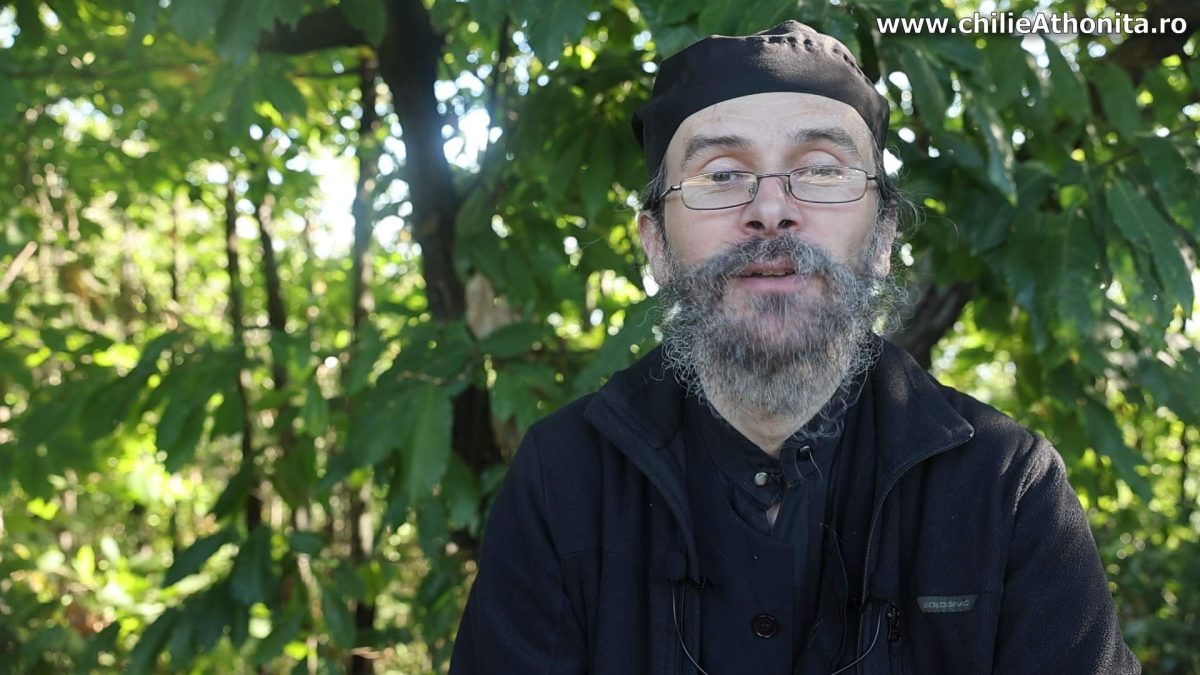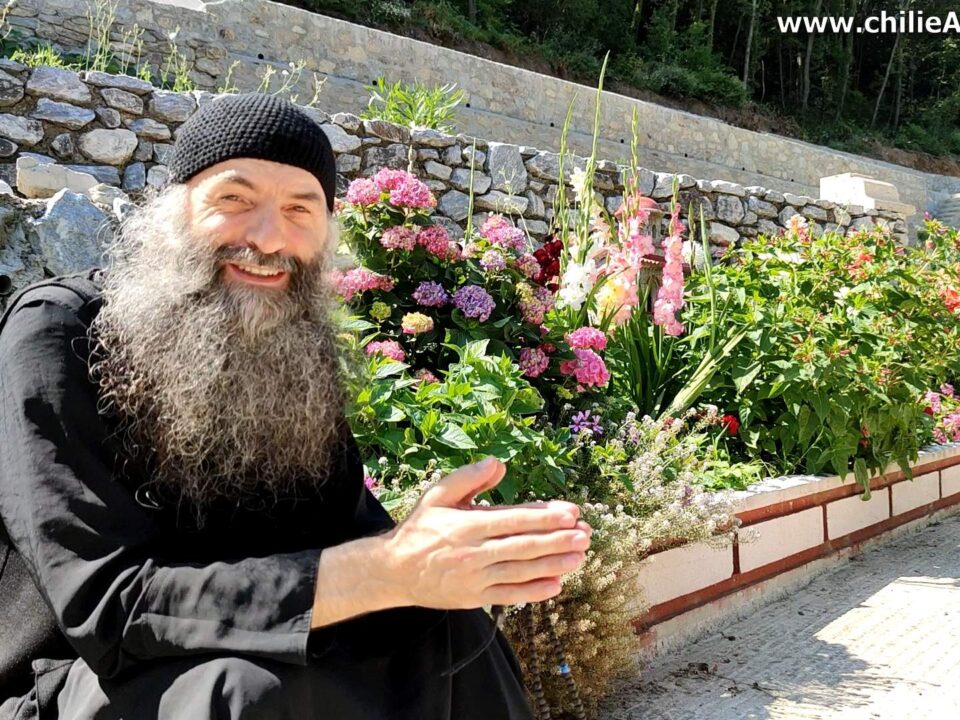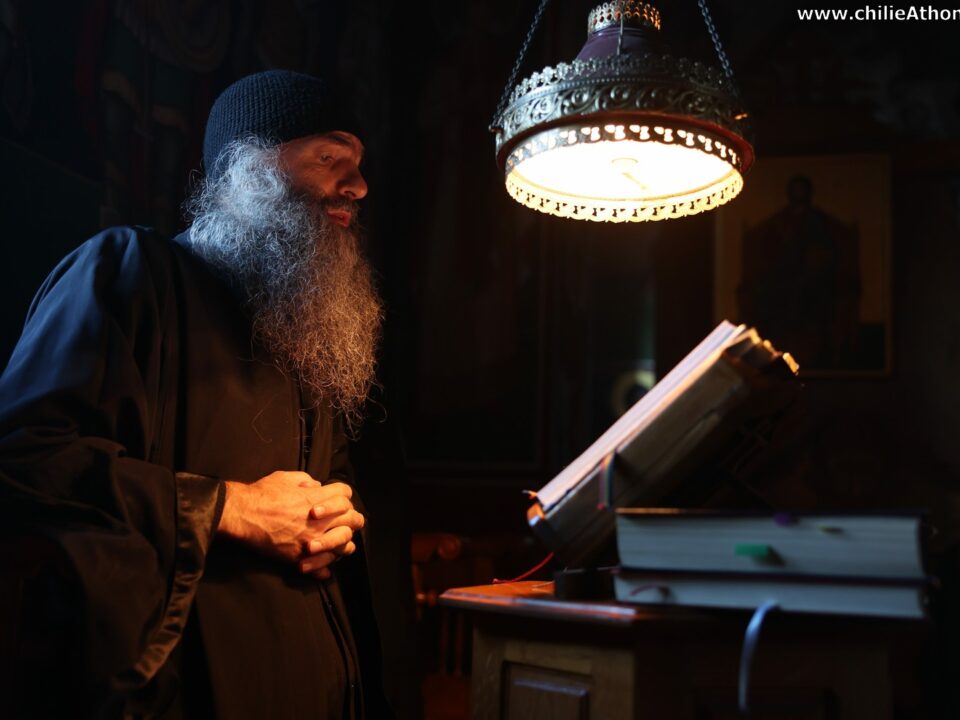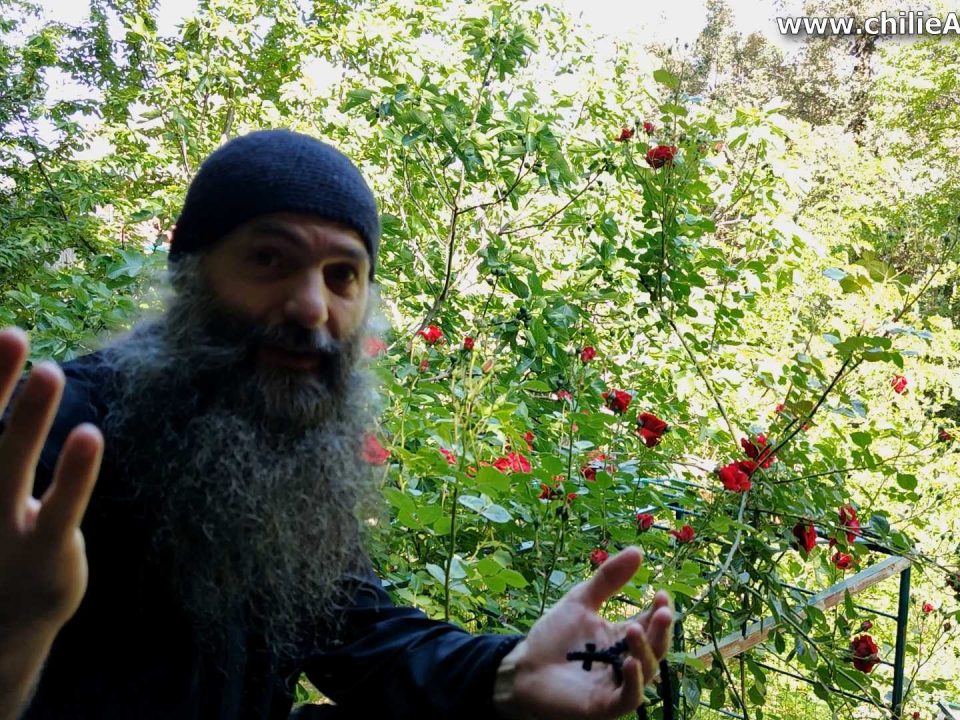
Myths and Truths About Your Security – Marius Voilă, Fr. Theologos
9 October 2022
Saint Paraskeva: Holiness in Youth – Fr. Pimen Vlad
14 October 2022Until Christ death was terrible for man. After Christ and in Christ man is terrible for death. Watch a video in which we talk about the path of our liberation from passions in a world so haunted by death.
Enjoy!
Glory to the Father, and to the Son, and to the Holy Spirit, now and forever and unto the ages and ages. Amen. Through the prayers of our Holy Fathers, Lord Jesus Christ, Son of God, have mercy on us! Amen.
We’ve talked about death – now we’re going to continue upon the topic a little bit and see what the effects of thinking about death are. You see that our correct position toward death is when we see death as an exit, as a deliverance from this changing world [that is] away from God. Do you understand? We must free ourselves from this world, because it keeps us away from God. This, of course, implies that after death we will be closer to God and not farther away.
So death is a passage, it is a closeness to God if we execute it correctly. In order to be closer to God both in this period and in the next period of our eternal life, we must be far from this world, as I said, and as I have said in previous episodes. So the true sign of those who remember death in their hearts and according to God is willing dispassion from all creation and complete abandonment of their will. Obedience, brethren!
Obedience. He who awaits death like this every day is a tried man. He who desires it every hour in this way is holy. Know that this is the sign of true memory of death, as I said – obedience. I say this because there are other desires of death that are not good. For example, there are some who have a stiffened passion – that is, they sin continuously and by force of habit because they got used to it for years and then they want death out of despair, as they say they cannot escape [any other way]. Some even commit suicide, brethren, God forbid! I spoke about this at length in the post about suicide.
Brethren, in this case, when man has such thoughts, it is not good to remember death – but rather the judgment that follows, the memory that man remains in that passion in eternity and therefore nothing is solved. This is what we must remember in order to extract ourselves from the passion. Judgment! Do you understand? And then let’s say, “I now have time to extract myself from the passion! Let me extract myself from the passion because if not, in eternity I will remain in this passion!” Do you understand?
At the opposite pole are those who do not think at all about death out of pride, out of self-confidence. Here, another characteristic form of this phenomenon of self-confidence is also willingness to become burdened with worries, brethren. Worries are very destructive when it comes to the memory of death, heaven and hell, as I said.
We want to have a career, we want to gather material things, to consume matter, and we forget that, by far, what is most important about us – the thing that differentiates us from animals is the divine, eternal nature of our soul. We have a soul that must subdue matter, free itself from matter, use matter as a slave, while animals have souls that are subject to matter—to the body, to food. This is the main difference between us and animals. It’s not that we don’t have a tail. Do you understand? It’s that we must subdue matter.
Our drama, then, is that we love matter and use souls instead of loving souls and using matter. Matter, brethren, this is what it is created for: to be used as proof of our love for God and for other souls. Here we must be careful, however: we do not want to assure everyone about our love for them directly, but it is better to ask God to show it to them in an unspeakable way. Better pray to God. The moment a person in need comes forward, of course you will help him, but let’s not seek that because if we do not pray first and rush, then we will not have enough time for connections – for relationships, for those things we hunt – and for the piercing of the heart, for crying.
We must weep, brethren, because the lack of heartache hardens our minds, that is, you know—good living, lots of food, lack of fasting, and other pleasures take away our sensitivity to understanding our condition. An unfeeling man cannot really know himself. He who does not lament about himself and does not mourn, does not reach the enlightenment of the mind to see who he is. God gives this enlightenment, but man must take the initiative, show that he desires it. It requires fasting and asceticism. Thirst and vigilance bring the piercing of the heart. And from the heart pierced by the dryness of fasting spring the waters of tears. Know that those who reach this state think of death under the influence of the Holy Spirit and desire their departure to unite with their Bridegroom. With Christ. Do you understand? Neither out of depression nor out of pride, do they see death, or rather, treat death. But from the cover of the grace of the Holy Spirit.
Now, if we humbly cry for God, let us not think that God is a lover of mankind. God is so, but if we think like that, then this thought that is from the enemy, brethren, in this case drives away weeping and fearless fear, as St. John Climacus says.
This thought—that God is a lover of mankind — is good only when we see ourselves being dragged along by despair, brethren. Of course, today there are many who fall into depression, into despair – especially those who are far from God, because depression is the disease of the unbeliever. Well, in this case, brethren, we need to balance the scales by remembering the real fact that God loves people. But if we advance in spirituality and experience this love more or less within us, in our heart, then we must think about judgment, about how far we are from God, and think with gratitude and humility that we are unworthy of the delicacy of God’s love. Do you understand?
Let’s be careful with pride! With the other side of extremes, because extremes always come from the devil, brethren. We must always have this thought – that is, the memory of death – because we do not know when we are going and in what state death finds us.
Now, you may be asking me; if the thought of death is so liberating, then why did God hide from us the moment [of our passing]? Why? You must know, brethren, that God is wonderfully working our salvation through this. Brethren, it’s because man is cunning. Not to say that man is a pig because he is a debasement to pigs, yes. For no one, if they knew in advance when they were going to die, would be baptized at an early age, or become a monk, or, in general, do good works, but would spend all his days in iniquity, laziness, in amusement, and would rush to baptism and repentance only at the hour of passing. Do you understand?
But, brethren, this is why God hides the time of death so that we may always be in vigil, not leaving it to the last moment. But know that if we leave it to the last moment, that is, if we acquire the habit of sin as a second nature, the distortion as a state [of being] from the long term habit of sinning, then we would remain totally uncorrected, we would remain so forever uncorrected and stiffened. Do you understand? This is why God hides from us the moment of death.
It is true that to improved fathers or people who are close to God, God, out of love, reveals to them the moment of their death because they know they will prepare themselves in Christ—that is, they will struggle even more. From the struggle they make they will struggle even harder and will not slack off. I know fathers who were aware of when they were going to die.
For the rest of us, brethren, we must always keep within us the memory of death and God’s judgment. As I said, however, this cannot be done if we are burdened and surrounded by worries. But we must have zeal and do good things, and then we will see the benefit. We will see that if we become accustomed to the thought of death in the love of Christ, we will overcome panic attacks, we will overcome cowardly and human fear, because the main cause of these fears is vain glory and unbelief, brethren, as St. John Climacus says.
Now, if we want to do the good things, as I said, then there are many spiritual theories, godly thoughts to think about: thinking about God’s love, remembering God, remembering the Kingdom of heaven, remembering the zeal of the martyrs, their struggles, yes, their courage…
Remembering God who is present, as it says in the Psalter: “I have set the Lord always before me.” It is always very important to feel God present here with us. So between me and you or between me and the lens, there’s a very short distance. Well, in this very short distance is God. Do you understand? And I ask Him to give me, with the prayers of my Holy Fathers, grace to speak to you. It is very important. Let us be aware of God’s presence.
Let us remember the angels—the understanding Powers, the remembrance of death, the response to judgment, the decision of Christ, and even the possibility of eternal torment, brethren. You know, we start with the biggest, the desired, the sweet and beautiful ones, and finish with the ones that should not be forgotten, brethren. Because they’re two sides of the same coin. Do you understand? You know, Father Joseph of Vatopedi was constantly thinking about death. It really was a leitmotif. There was even a time when he would say, “That’s it! I’m dying! I see the grave in front of me! I’m going! Tomorrow I’m gonna die, that’s it, it’s over, in a few days I’m gone!” and [he said] this continuously. So often did he say this, and with such certainty that some of the fathers even believed that the great elder had had a revelation from God on this subject, and they were very anxious that the elder was going to pass away. Do you understand?
It had gone so far that St. Paisios said to Gheronda Joseph, “Father, do not say that any more, the monks are troubled!” This was at a time when Saint Paisios was still alive and all the fathers in the brotherhood were very young. Do you understand? Since then, the elder lived for, I don’t know, a few decades more, he lived for 25 more years for sure, 30 more years, I think.
But if we don’t think about death, then the enemy troubles us with various worries – with such-and-such – I have to improve this, to do this! I have to struggle to do this and this and that and the other and so on… Then inner tensions and anxieties arise which, if not fought, also flow externally, and then fights also arise between brothers through pressures on my part – especially if I am a leader, if I have authority – pressures that are actually echoes of inner hell, of inner pressures. I mean [saying],”Do that, let’s do that!” Brethren, [it should be done] with peace! With peace, with peace! Leave it! Let us always think of death, that death is coming! And very few things matter.
The things that matter are only those with which we go beyond death, that is, virtues or, well, sins, God forbid! Of course people and especially monks should not sit around – laziness is a great, great sin; a great passion, brethren! Do you understand? But for someone who knows, it can not only been seen, the difference between the one who gives work to someone so that he is not idle and destroyed, that is, as to not be overtaken by laziness and thus to be a slave to the love of pleasure and to the terrible akedia, brethren, and the one who gives work to someone out of the desire to succeed in this world, out of a desire for worldly fulfillment, money, and so on, this difference can be seen very well even if it hides under the guise of piety.
Let me give you an example so you can see that people think it’s one thing and actually it was something else. There was a brother or monk… No one really knew what he was. He walked around Karyes alone, wandered around and drank continuously, he was crimson all day, brethren, so he was such a big drunkard. St. Paisios saw him – since we were talking about [St. Paisios] I remembered this incident – and he calls him from where he was and says: “I’ll give you work, I’ll give you a drink—just stop drinking alone. Always come to me and I’ll give you as much as you want!” Do you understand?
Now St. Paisios had him chop wood—very hard work to tire his body. Of course, in Karyes and not only, there were rumors – understand that at that time, some people knew Father Paisios as a saint, but in general he was considered an ordinary father. And people were talking, “Look, he got mixed up with drunkards…” “He’s giving him drinks” and all that. Do you understand? Serious stuff.
At one point a television crew came with such disparaging intentions against the Church and they saw this guy in Karyes walking around and they found out he was a drunk and they went to ask this man how it was in the Holy Mountain. And then, this drunk told them about St. Paisios, and despite the expectations of the respective television crew, the documentary turned out very well. Do you understand? That’s a parenthesis.
On the other hand, however, the whispers were there, and it was difficult. Because St. Paisios had tarnished his reputation for being with this guy and drinking and so on. Finally, brethren, you must know that this drunkard brother dies and dies a very pious death. Several fathers have seen this, and even one of them had revelation from God on the subject.
Then they went to Saint Paisios, they said: Father Paisios, how come…? Then Saint Paisios said to them: “Look, this was the matter, so this man was from a family in Asia Minor, they were very poor and his parents did not have milk when he was a child for him to drink. And then, to silence him, they gave him brandy to drink, a strong spirit. And then this man had become addicted, his body had deformed in such a way that he had become addicted to drink and he couldn’t live without it.” And then St. Paisios, thinking about death, did everything possible to ensure the best possible balance, a death as close as possible to God – if you like. That is, not to let the passion overflow. He did everything he could, do you understand? And so this man, through his struggle, under the spiritual control of St. Paisios, was saved. Do you understand?
If the Saint had not had death in mind — that is, how to maximize, as I said, man’s goodness and exit into eternity, and minimize evil and dependence—I pray, as far as possible, he would not have acted like this. If he hadn’t had death in mind, then he would have been interested in what people were saying—this and that, and so on. Do you understand? Brethren, those who died to all and remembered death, because those who discovered the lack of attraction and false fullness of everyone in the world discovered the infinity that awaits them after separation from the world by death.
Brethren, everything here on earth is laughable, pitiful, and nothing compared to the infinity that awaits us. These are capital, of course, they are very important, because based on them, we establish ourselves in our place in eternity. But if we absolutize them, we are lost! So he who is still bound to them does not cease to work against himself until death catches him, caught in the monotony of this world, brethren. Do you understand?
Matter does not fulfill the person. If it were not for the person, brethren, there would be no true infinity and the possibility of advancing in it. Rather, if it were not for the infinite person of God to whom we strive infinitely, there would be no true infinity to fulfill us. On the other hand, the perspective of the eternally new infinity of purity, of love, opens up for someone after he is bored, tired of the monotony that exclusive attachment to the world can offer, an attachment that also seems to have an infinity, but an infinity in the monotony of repetition and therefore an apparent infinity, an infinity that at some point becomes faint, brethren, like tea, together with the thirst for this finite infinity of this world.
Man, at some point, gets tired of consumerism, gets tired of taking over the same kinds of things that offer nothing new, nothing to satisfy his thirst for true infinity of spirit, to satisfy his thirst for the Truth that is in true infinity, that is beyond death.
You know, brethren, the apparent infinity of the world cracks at some point for the spirit fed up with it, and through this crack springs from its hiding place the true infinity, that of the order of the Spirit, like a light. I really like this picture. Saint Dumitru Stăniloae mentions it. This breaking of the slag of this world.
The aspiration to advance into true infinity is aided not only by our longing for it, but also by the constant fear of remaining chained by passions in the monotony of this world. Otherwise… we absolutize a temporary thing, we make it an idol, because man cannot do without God, and if he separates himself from the true God and, therefore, from the true heaven, from eternal heaven, and the moment this “pseudo-heaven”, that is, the idol that is transient of course, passes away, then we fall into hell.
And the characteristic of hell, brethren, is madness, going mad, torment to the maximum. For example, we absolutize a job, a social position, a relationship with someone, an attachment to someone or something, a sentimental relationship, all of that. If this goes away or – worse – disappears, then we panic, we have a lot of thoughts, we send a lot of messages, words, actions left and right – we behave erratically, brethren; We live in hell.
Saying “What do I do if I lose my job, if I break up with my loved one, if something happens to my loved one, if, if, if…” Brethren, forget it! The devil does all this because we attach ourselves more than we have to, we get attached in a distorted manner to things and do not want to lose them. We get stuck in this and our nervous system wobbles to collapse because our idol is relative, limited, and temporary, and we want it to be perfect, absolute, and eternal.
Sometimes it can hide, as I said at the beginning of the video, under the guise of piety. Do you understand? Attachment to the eternal Christ, the thought of our eternity, of death in Christ and the passage beyond it into the loving communion of persons; that’s what saves us, brethren. In the perfect personal infinity we want so much. For this reason, let us be careful not to absolutize the transient, as I said, in order to gain eternity, to be careful not to waste time, brethren, and to count each day of our lives as the last here on earth. I also gave examples on this topic.
Every night let us ask ourselves: if by morning I die, where do I go? And every morning let us ask ourselves: if by tonight I die, what am I going to do today? Will I get closer to God? Am I going to love the eternal things more? Will I love my neighbor more? Will I free myself from earthly things? We must die free, brethren, we must die properly. And freedom is internal, brethren, and not so much external. Of course, the outer one has its importance, but we will not obtain it. In fact, we obtain nothing, brethren, if we do not learn to die rightly in Christ. Do you understand? If we don’t obtain inner freedom. And, in fact, this is what all the ascetics of the Orthodox Church do. This is the therapy of Orthodoxy. Know the Truth, that is, Christ, and the Truth will set you free. This is what our Lord Jesus Christ said, I did not say it!
Or if you want me to quote, I quote from Mr. Mihai Eminescu: “I didn’t think I’d ever learn to die.” Brethren, the saints have learned. This is why they are saints and why they are presented in icons, in images, as elders, before death. Because for them death is a passage to true life. Whereas in our case, we promote images in which we are young because our path is the path of sin, of passing to true death. And we don’t like images when we’re old. Whereas for saints, the images when they are old are the most beautiful because they are directed towards life, towards loving eternity in Christ, brethren.
Let us have courage, let us have zeal and let us learn to die! Let us not be afraid of death! And this is accomplished only in Christ and through Christ! Know the Truth and the Truth will set you free! And we will also defeat death. May the good God help us!
Through the prayers of our Holy Fathers, Lord Jesus Christ, Son of God, have mercy on us! Amen.
Online commemoration lists and donations
May the Lord help us!
Online Commemoration Lists and Donations
May the Lord help us!
If you have a bank card and wish to send commemoration lists and donations online using your card, and/or to support our philanthropic activity, including this site, please fill out the form below to make a small donation. The form is secure – we use Stripe for payment processing – a world leader in this field. We do not collect your personal data.
If you do not have a card, or do not wish to use it, visit the webpage for Online Donations and Commemoration Lists.
We will pray for your loved ones! (Please do not include inessential details like wishes, degree of kinship, introductions etc. JUST the name!)
Especially for recurring commemoration lists, we ask that you please keep them to under 20 names long. If you include a member of the family, we add “and for their families.”







